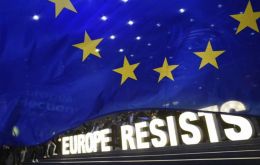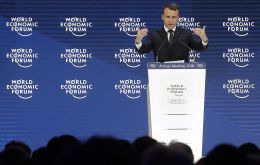MercoPress. South Atlantic News Agency
Tag: Nationalism
-
Friday, November 1st 2019 - 09:24 UTC
What happens to the United Kingdom now?

By Chris Patten – Even after the United Kingdom leaves the European Union, the country will face years of talks in which it will be negotiating from a position of weakness. The UK will be less prosperous and influential than before and will be under increasing internal strain because of policies driven by malignant English nationalism.
-
Monday, September 2nd 2019 - 09:04 UTC
Germany asks the Polish people for forgiveness on the 80th anniversary of the outbreak of World War II

Germany’s president expressed on Sunday deep remorse for the suffering his nation inflicted on Poland and the rest of Europe during World War II, warning of the dangers of nationalism as world leaders gathered Sunday in the country where the war started at incalculable costs.
-
Friday, May 31st 2019 - 09:55 UTC
Trumpism did not sweep across Europe as it did in the US

The best way to describe what just happened in the European Union elections is to say that the choices are getting clearer ― and a lot of people are realizing which side they are on. The elections to the EU Parliament held last week in 28 European countries ― including the United Kingdom, since three years after the Brexit referendum, it still hasn't managed to leave ― was the second-biggest democratic exercise in the world.
-
Thursday, December 6th 2018 - 09:28 UTC
Populism is not an ideology, it's a political technique which thrives on angry people

Five of the world’s largest democracies now have populist governments, claimed The Guardian last week, and proceeded to name four: the United States, India, Brazil and the Philippines. Which is the fifth? At various points it name-checks Turkey, Italy and the United Kingdom, but it never becomes clear which. (And by the way, India’s prime minister Narendra Modi is not a populist. He’s just a nationalist.)
-
Thursday, January 25th 2018 - 10:06 UTC
EU leaders warn on nationalism and call for global cooperation ahead of Trump's speech

European leaders warned at the World Economic Forum in Davos on Wednesday against a return to nationalism, with France’s Emmanuel Macron and Germany’s Angela Merkel calling for more global cooperation to harness the forces of globalization.
